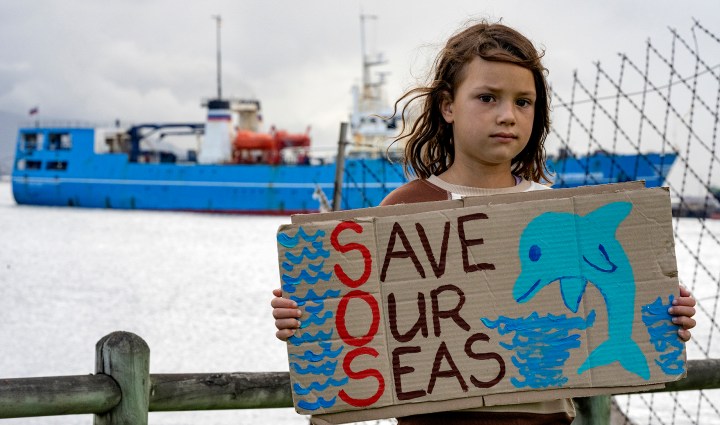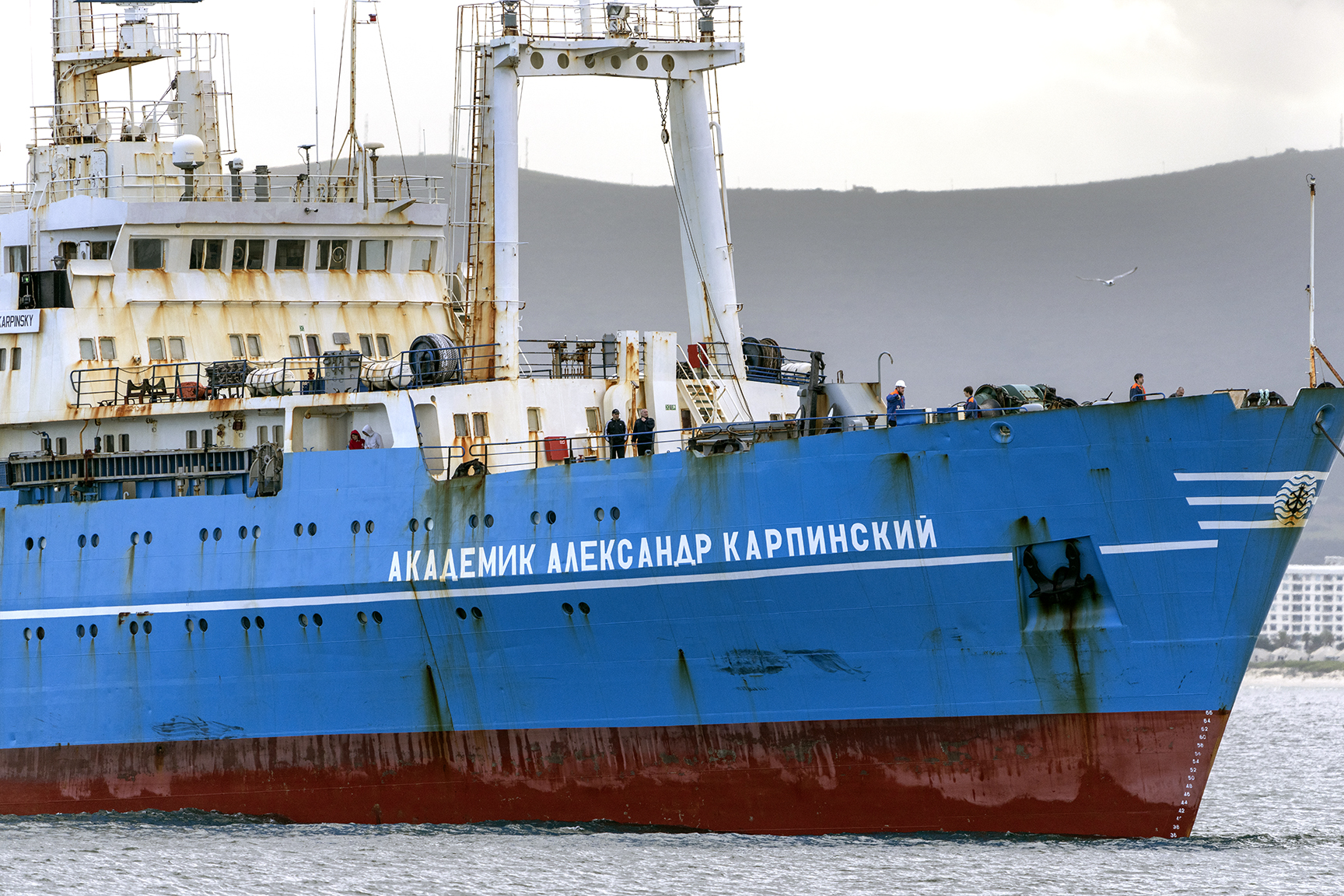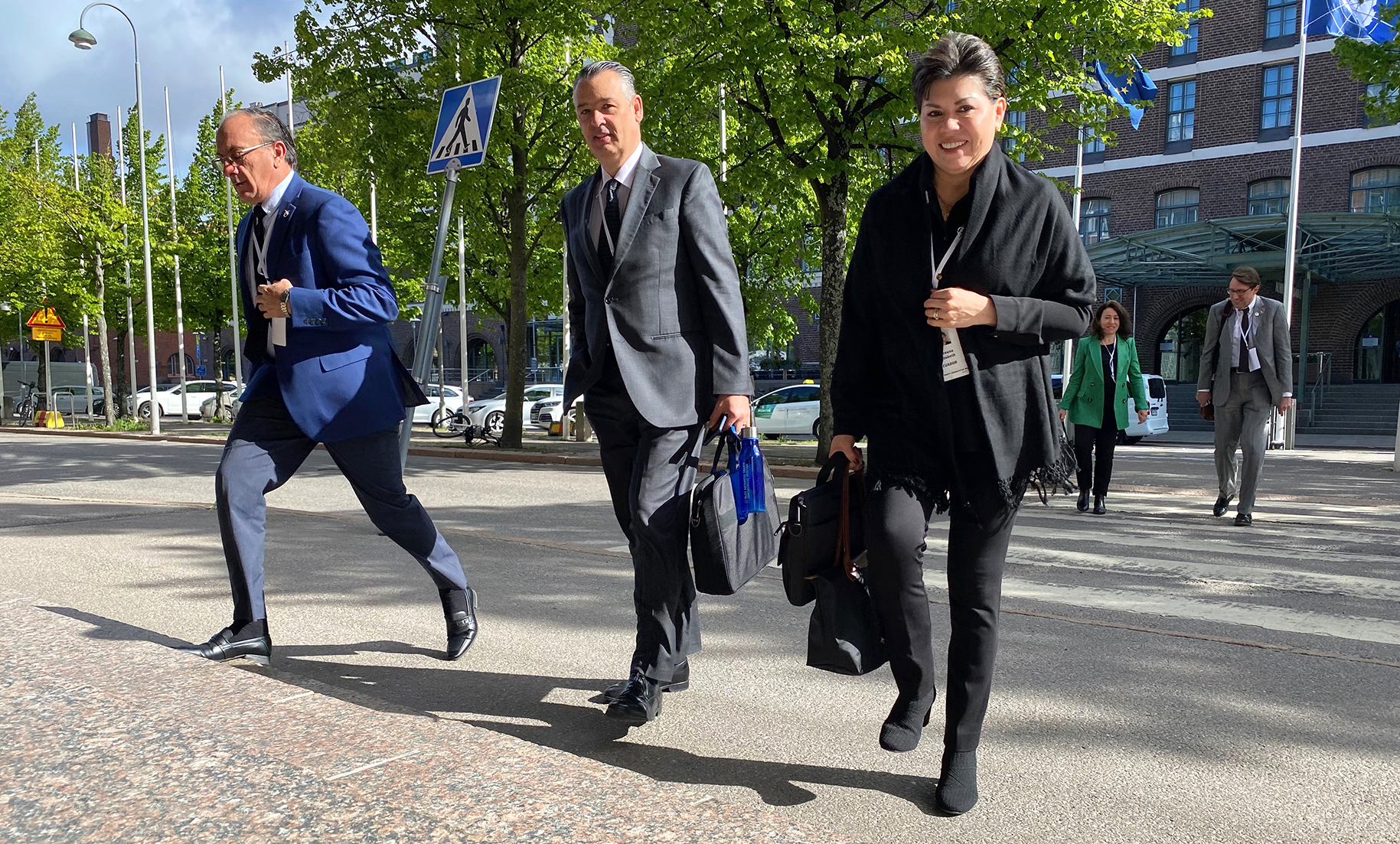BATTLEGROUND ANTARCTICA
Melting ice, geopolitical heat? Westminster hears of simmering Antarctic ‘mining’ threat via Cape Town

During a new UK House of Commons inquiry into British South Pole interests, a leading academic has told MPs that Russian oil and gas surveys via Cape Town may raise questions about the vulnerable region’s future. Citing a Daily Maverick investigation, Professor Klaus Dodds noted that international law would, eventually, allow any signatory state to walk away from Antarctica’s mining ban and the wider treaty edifice.
The House of Commons’ Environmental Audit Sub-Committee on Polar Research in Westminster has been briefed on the potential long-term threat of mining activities to Earth’s southernmost frontier, as ice melt in the region may open up new possibilities.
Opened in July, the inquiry has included oral evidence sessions in December and February focusing on Antarctic climate change, the conservation role of science, and how well the British Antarctic Survey and other UK entities have complied with the region’s 1959 treaty. The 29-state Antarctic Treaty devotes the vast, ice-covered territories at the bottom of the world to peaceful pursuits such as tourism and science.
Feared for its potential to cause ecological harm in a sensitive wilderness, mining is banned here under the treaty’s environmental constitution. Known as the Madrid Protocol, this constitution is signed by 42 states, including the 29 consultative parties with decision-making powers.
However, Professor Klaus Dodds, specialising in Antarctic geopolitics for the past 30 years, devoted some of his testimony to flagging a controversial withdrawal clause set to take effect from January 2048.
WATCH: Professor Klaus Dodds, a geopolitics specialist at Royal Holloway, University of London, testifies at Westminster’s February 2024 inquiry on the UK’s Antarctic interests. (Source: Parliamentlive.tv)
“You can announce that you want to walk away,” said Dodds, executive dean at the School of Life Sciences and Environment at Royal Holloway, University of London. Also an author of books on geopolitics, the poles and James Bond, Dodds was referring to the Vienna Convention on the Law of Treaties — a foundational roadmap on how to modify agreements. “You can withdraw straightforwardly after two years of receipt that you wish to withdraw.”
The geopolitics professor was responding to a question by Labour MP Anna McMorrin, who asked how likely it was that the mining ban would face challenges in 2048, which, she said, was “now not that far away”.
Tory MP James Gray had also asked whether ice changes could expose the Antarctic to the possibility of mineral extraction. Described by an academic insider as a champion of the polar regions, Gray suggested that the ban could become “more and more difficult to sustain for the same reason”.
He referred to it as “the presumption against material exploitation”.
Antarctic mining threat: a delicate legal landscape
Dodds stressed the complex legal processes needed to alter the Madrid Protocol’s ban clause.
Citing a series of investigations by Daily Maverick, Dodds asked what could be gained “by walking away” or “no longer adhering to the protocol”.
“Because I could put a suggestion to the committee which goes along the lines of, at the moment, a South African-based newspaper, the Daily Maverick, has been reporting fairly routinely that a Russian survey ship has been carrying out seismic surveys in and around Antarctica for the purpose, potentially, of mineral prospecting,” said Dodds. He noted the Russian perspective: that state-funded research was entirely possible without “necessarily” leading to mineral exploitation.
Daily Maverick’s reports have tracked Rosgeo’s oil and gas seismic surveys in the Southern Ocean under the flag of the Russian Antarctic Expedition, which has used Cape Town as a transit port at least since the 1991-signed mining ban entered into force in 1998.

The Akademik Alexander Karpinsky sails into the Port of Cape Town, a formal Antarctic gateway city, at 9.30am on 3 April 2023. (Photo: Nic Bothma)
South African Environment Minister Barbara Creecy’s spokespeople previously told Daily Maverick that Rosgeo, the Kremlin’s chief mineral explorer, had the right to pursue its research objectives under the treaty’s “freedom of scientific investigation” principle.
This principle makes provision for research ranging from astrophysics to microscopic zoology, and it was used by Japan for years to justify its now withdrawn “scientific” whale slaughter. The ban, also called Article 7, prohibits “any activity relating to mineral resources, other than scientific research”.
Science is not a defined concept in the protocol or associated texts.
‘Freedom of scientific investigation’
In response to Daily Maverick’s queries, Russian authorities also invoked this principle to explain their “research” activities, which other academia have argued conform to early-stage prospecting. Rosgeo’s Antarctic agency, the Polar Marine Geosurvey Expedition, has also produced extensive inventories of other minerals. However, other states are known to have produced broad minerals “research”, so Russia is hardly alone in this.
“Part of our challenge is knowing what others are doing and how to make sense of it,” said Dodds, flagging fishing activity as a more immediate concern. For instance, the UK and US have clashed following the UK’s insistence on harvesting seasonal toothfish off South Georgia despite Russia blocking its quotas at the annual Hobart meeting.
A 2023 European Union-commissioned report, co-authored by Dodds, highlighted similar concerns relating to both minerals and fishing.
‘Reassure me’
The panel’s questions to several Antarctic experts were heavily weighted by Tory MPs, but Labour MP Barry Gardiner suggested he was alarmed by descriptions of great power “posturing”. Gardiner asked the testifiers to “reassure” him that governance in the southern frontier was not all a “great game” — “with the one exception that actually there’s some decent climate science that happens to go on there”.
WATCH: Extinction Rebellion Cape Town’s Jacqui Tooke during a Table Bay protest on 3 April 2023. Here, Tooke flags ‘any country that is breaking the treaty, causing harm to the Antarctic and also searching for fossil fuels’. (Video: Tiara Walters / Nic Bothma)
Dr Daniela Portella Sampaio, a treaty secretariat advisor at Germany’s Alfred Wegener Institute, said Antarctica’s extreme weather forced countries to cooperate. University of Bristol environmental historian Dr Adrian Howkins argued that Antarctic geopolitical tensions were not new, dating back to the Cold War and earlier.
Yet, in January, Russia put its 3,000m² Novatek-funded station into pilot operation in East Antarctica, followed by China with the completion of its fifth base at Inexpressible Island in West Antarctica’s Ross Sea.
Geopolitical movements were not necessarily unprecedented, Dodds agreed, but remarked that Russia and China now had more influence in this strategic polar theatre than in 1959.
George Bush Sr’s wrecking ball clause
It is often incorrectly reported that the ban has an expiry date. Yet, as Daily Maverick has reported consistently, the ban has no expiry date.
What is less often aired is that some majority approval rounds can eventually sink the ban after January 2048.
This poses a bitter irony for a governance framework that views the ban as the cornerstone of an acclaimed cooperation system that, for the most part, revolves around something else: consensus-making (no one must object).
As their condition for signing the 1991 protocol, it was US President George Bush Sr’s administration that alone ensured that the mid-century generation would inherit a changeable ban that could be reversed through majority voting.
“The United States was prepared to agree to an indefinite ban on mineral resource activities, but refused to accept a permanent ban in the event minerals would need to be obtained from Antarctica in the future,” a now-defunct House of Representatives committee told their subcommittee colleagues in 1992. “The US insisted upon the withdrawal clause as a condition of signing the protocol.”
About 32 years later, a US-led push involving most decision-maker powers reaffirmed Bush’s idea of a mining ban at the 2023 consultative meeting in Helsinki.

Delegates arrive for the first-ever full-day climate session at an Antarctic Treaty Consultative Meeting in Helsinki, the Finnish capital, on 2 June 2023. (Photo: Tiara Walters)
The US embassy to South Africa told Daily Maverick that this “demonstrates how strong the global commitment is to preventing commercial mineral extraction, including fossil fuels, in the region”.
However, the protocol is designed for a review of its mechanisms should even just one state call for it at any point in the indefinite expanse of time from 2048 onwards. This may risk giving the ban’s first 50 years of life an air of pure symbolism, and provoke geopolitical tension. At worst, a state, or states, can exit the protocol if a binding new regime on “mineral resource activities” is not in force within three years of adoption — as we have noted here, here and so on.
Here, it is also worth noting that the Antarctic Treaty’s liability annex on environmental emergencies — a separate but linchpin piece of polar law — is still not in force nearly 20 years after its 2005 adoption in Stockholm.
Frozen status quo
A ban that is not actually immune to expiry has no expiry date.
That subtle distinction confuses laypeople, media and even scientists, who — in turn — irritate the academics who specialise in this field.
In 2022, New Zealand and German academia called for an unmodifiable ban that can never risk environmental destruction through changes that may prove fatal.
Or risk confusing any more people.
The Antarctic and Southern Ocean Coalition (Asoc), the treaty’s environmental observers, circulated a similar proposal “for all delegates to read” at Berlin’s 2022 consultative meeting.
Asoc did not formally introduce this proposal and it was ignored by sitting states.
Read more in Daily Maverick: ‘It’s a moral disgrace’: Cape Town mayor spits fire as Russian seismic ship sails to Antarctica
No Antarctic state, including South Africa, has acknowledged Rosgeo’s extensive praise in recent years of the climate-threatened Antarctic’s oil and gas potential, or the mineral explorer’s seismic surveys via Cape Town. (In 2020, among multiple other similar statements in the past decade, Rosgeo issued a communiqué from Cape Town harbour claiming there were 500 billion barrels of oil and gas in the Southern Ocean, but did not share recoverability estimates.)
Right now, the Karpinsky, the Rosgeo seismic blaster with airguns that caused days of anti-noise and climate protests in Cape Town last year, is heading towards the Port of Montevideo in Uruguay. From there she is expected to continue seismic investigations in the West Antarctic where Russian shipping reports have previously described the Southern Ocean’s mineral potential.
The parliamentary inquiry’s report was expected within the next few months, the February sitting said, with a government response likely by the July recess. DM




















 Become an Insider
Become an Insider
As Russia has recently demonstrated, it doesn’t care about world opinion. Were they to start exploiting oil and gas reserves in the Antarctic waters, would any nation have the courage to try to stop them. Many nations including South Africa would be on the sidelines applauding them. Afterall, there’s not a huge difference from what is happening in the Antarctic at present as the krill, which is at the bottom of the food chain is vacuumed up to feed Chinese pigs.
As far as the Treaty goes, I suspect that by 2048, there will have been several global catastrophes which may focus the minds of politicians on existential threats.
Even more worrying is the Chinese Antarctica presence. They have recently expanded their research stations, which now come to over five on the continent. The concern is that much of the scientific research could be reputposed to have a dual military purpose to spy on the American, Australian and New Zealand stations.
And considering how cosy Russia and China are its a legitimate concern to wonder what was said behind closed doors with these two and their intentions in Antarctica.
followed by China with the completion of its fifth base at Inexpressible Island in West Antarctica’s Ross Sea.
Anyone think the CCP will be told what they can and cannot do down South ?
Tiara is on a mission – a great mission to save an irreplaceable part of our planet that will also impact on every other continent! Support DM! And Tiara. They need our voices to be raised in great support.